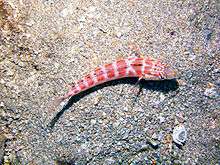Capricorn lizardfish
| Capricorn lizardfish | |
|---|---|
 | |
| Scientific classification | |
| Kingdom: | Animalia |
| Phylum: | Chordata |
| Class: | Actinopterygii |
| Order: | Aulopiformes |
| Family: | Synodontidae |
| Genus: | Synodus |
| Species: | S. capricornis |
| Binomial name | |
| Synodus capricornis Cressey & J. E. Randall, 1978 | |
The Capricorn lizardfish (Synodus capricornis) is a species of lizardfish that lives mainly in the Pacific Ocean.
Information
The Synodus capricornis is known to be found in a marine environment [1] within a demersal depth range of about 20 - 88 meters. This species is native to a subtropical climate. The average length that the Synodus capricornis can grow to as an unsexed male is about 21 centimeters or about 8.26 inches. The species is recorded to occupy the areas of Pacific Ocean, Taiwan, Tonga, Hawaii, Easter Island, and Pitcairn. [2]They are considered to be a benthic species. They are found at the sandy areas that surround reefs. [3] Even though this species can be found in various locations, its common and most popular place to populate is in the Pacific Ocean. [4] The Synodus capricornus is recorded to be a resilient species that was able to double its population in fifteen months. [5]
Common names
The common names for the Synodus capricornis are as follows:
- Hawaiian : 'Ulae
- French : anoli à Capricorn
- English : Capricorn lizardfish
- Spanish : lagarto dos Capricorn
- Mandarin Chinese : 羊角狗母魚 [4]
Classification
The taxonomic classification of the Synodus capricornis is as follows:
- Kingdom: Animalia
- Subkingdom: Bilateria
- Branch: Deuterostomia
- Infrakingdom: Chordonia
- Phylum: Chordata
- Subphylum: Vertebrata
- Infraphylum: Gnathostomata
- Superclass: Osteichthyes
- Class: Osteichthyes
- Subclass: Actinopterygii
- Infraclass: Actinopteri
- Cohort: Clupeocephala
- Order: Aulopiformes
- Family: Synodontidae
- Subfamily: Synodontinae
- Genus: Synodus
- Specific name: capricornis
- Scientific name: Synodus capricornis [6] [7]
References
- ↑ "Synodus capricornis (Capricorn Lizardfish)". Zipcode Zoo. Archived from the original on 7 December 2014. Retrieved 16 April 2013.
- ↑ "Synodus capricornis Cressey & Randall, 1978 Capricorn lizardfish". Fish Base. Retrieved 16 April 2013.
- ↑ "Synodus capricornis — Overview Capricorn Lizardfish". Encyclopedia of Life. Retrieved 16 April 2013.
- 1 2 "Capricorn lizardfish". Thewebsiteofeverything.com. Retrieved 16 April 2013.
- ↑ "Capricorn lizardfish (Synodus capricornis) fish profile". Guppies. ZA. Retrieved 16 April 2013.
- ↑ "Synodus capricornis Capricorn lizardfish (Also: Capricorn lizardfish)". Animal Diversity Web. Retrieved 16 April 2013.
- ↑ "Synodus capricornis Cressey and Randall, 1978". Discover Life. Retrieved 16 April 2013.
Notes
- Froese, Rainer and Pauly, Daniel, eds. (2012). "Synodus capricornis" in FishBase. April 2012 version.